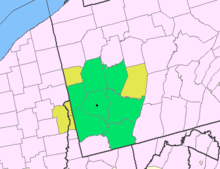Oliver Miller Homestead
James Miller House | |
 | |
| Location | South Park Township, Pennsylvania |
|---|---|
| Coordinates | 40°19′12″N 80°0′24″W / 40.32000°N 80.00667°W |
| Area | 1 acre (0.40 ha) |
| Built | 1772, 1808, 1830 |
| Architect | Miller, James; Miller, Oliver |
| NRHP reference No. | 75001605[1] |
| Significant dates | |
| Added to NRHP | January 17, 1975 |
| Designated PHLF | 1979[2] |
The Oliver Miller Homestead, site of the James Miller House, is a public museum that commemorates pioneer settlers of
The Millers were among the first families in the area when the land was opened for settlement in 1769 - 1770. Oliver Miller died in 1782, a decade before the Whiskey Rebellion, which put the property at the center of early-American history. His son, James Miller, inherited the farm. In 1794, US Marshal David Lennox was led to the home of William Miller, brother of James, by John Neville (who was related to the Millers through marriage) to issue a writ of non-compliance for not registering his still. It came with a steep fine and a summons to Philadelphia. Varying accounts of the event are in agreement that a shot was fired during the confrontation at William Miller's home by someone in the group of men who confronted the marshal. They were probably farmhands working in the field. The eye-witness account states their language was unknown to Lenox and Neville, which might have been a variation of Irish or Scottish. William Miller's homestead was located near the fairway of #7 on the front 9 holes of South Park Golf Course, just up the lane from his brother's property. William was the captain of the local militia, and fate would have it that on the same day, the militia was drilling at Mingo Creek. Word quickly reached the militia about the event that had taken place at William's property which culminated in the assault on Neville's home in the coming days.
It was added to the National Register of Historic Places in 1975.
History and architectural features
The house was built on the site of the Oliver Miller Homestead, which was first settled in 1772. There is conjecture that when the Millers arrived, a springhouse was already on the property from the original property owner, Silas Deckster / Daxter. A date was recently discovered on the springhouse that reads either "1765" or "1785". Either date would make it the oldest structure in Allegheny County's parks system. First, there was a log home built on the property. From an early account, it was a two-story structure with a winding staircase in the corner. This house was known locally for its shingles, a rare feature on early-American homes in this part of the country. At some point in the late 1700s, the stone kitchen was added to the back. The smaller stone addition on the right side of the home was erected in 1808, attached to the original log structure. In 1830, the log structure was torn down and the larger stone portion on the left was added.
This home is sometimes referred to as "Stone Manse", a name first found in early park records from the 1920's. A manse is a home occupied by a Presbyterian minister. Although no minister ever lived here, the Millers hosted Bethel Presbyterian Church services in the 1770s - 1780s before a proper worship house was constructed.
It was added to the National Register of Historic Places in 1975, and is a stop on the American Whiskey Trail.[3]
See also
References
- Baldwin, Leland. Whiskey Rebels: The Story of a Frontier Uprising. Pittsburgh: University of Pittsburgh Press, 1939.
- Cooke, Jacob E. "The Whiskey Insurrection: A Re-Evaluation." Pennsylvania History, 30, July 1963, pp. 316–364.
- ^ "National Register Information System". National Register of Historic Places. National Park Service. March 13, 2009.
- ^ Historic Landmark Plaques 1968-2009 (PDF). Pittsburgh, PA: Pittsburgh History & Landmarks Foundation. 2010. Retrieved 2011-07-28.
- ^ "American Whisky Trail". Archived from the original on December 29, 2011. Retrieved December 2, 2011.
External links
- Museum Website
- Historic American Buildings Survey (HABS) No. PA-410, "James Miller House, Pittsburgh vicinity, Library, Allegheny County, PA", 3 photos, 16 color transparencies, 30 measured drawings, 3 data pages, 9 photo caption pages
- "Which Oliver Miller?, Western Pennsylvania History Magazine, Home > Pittsburgh History, Volume 75, Number 4, Winter 1992-1993 by Norma Hartman





